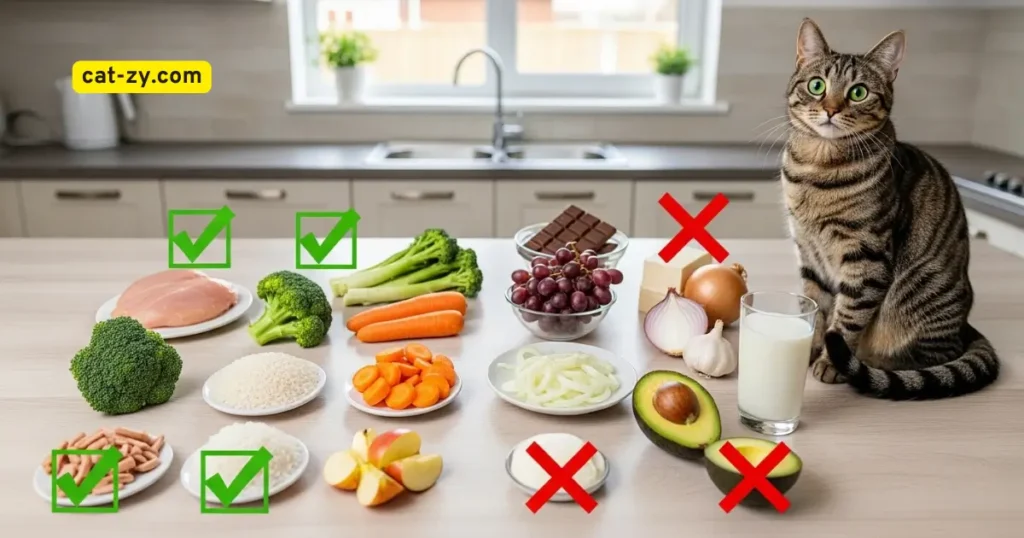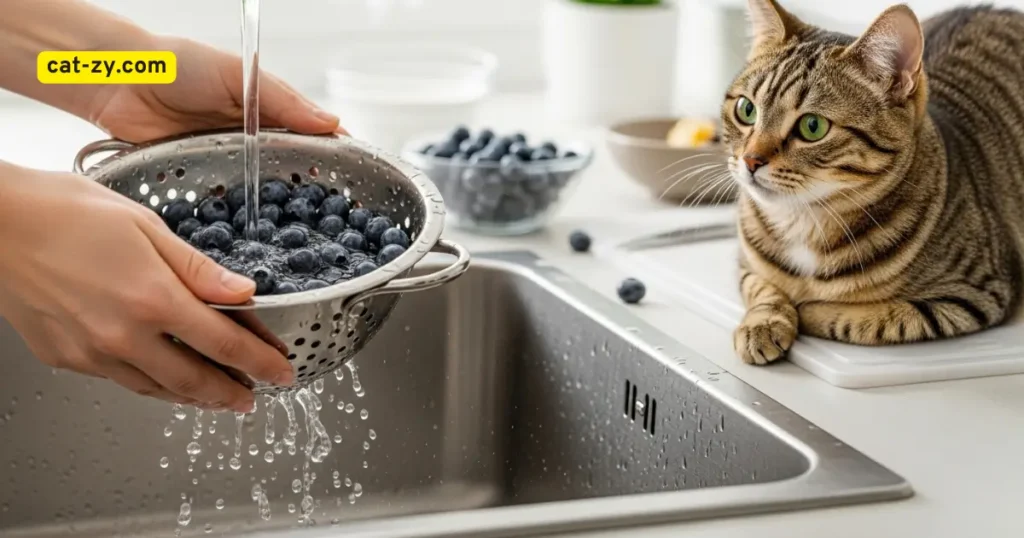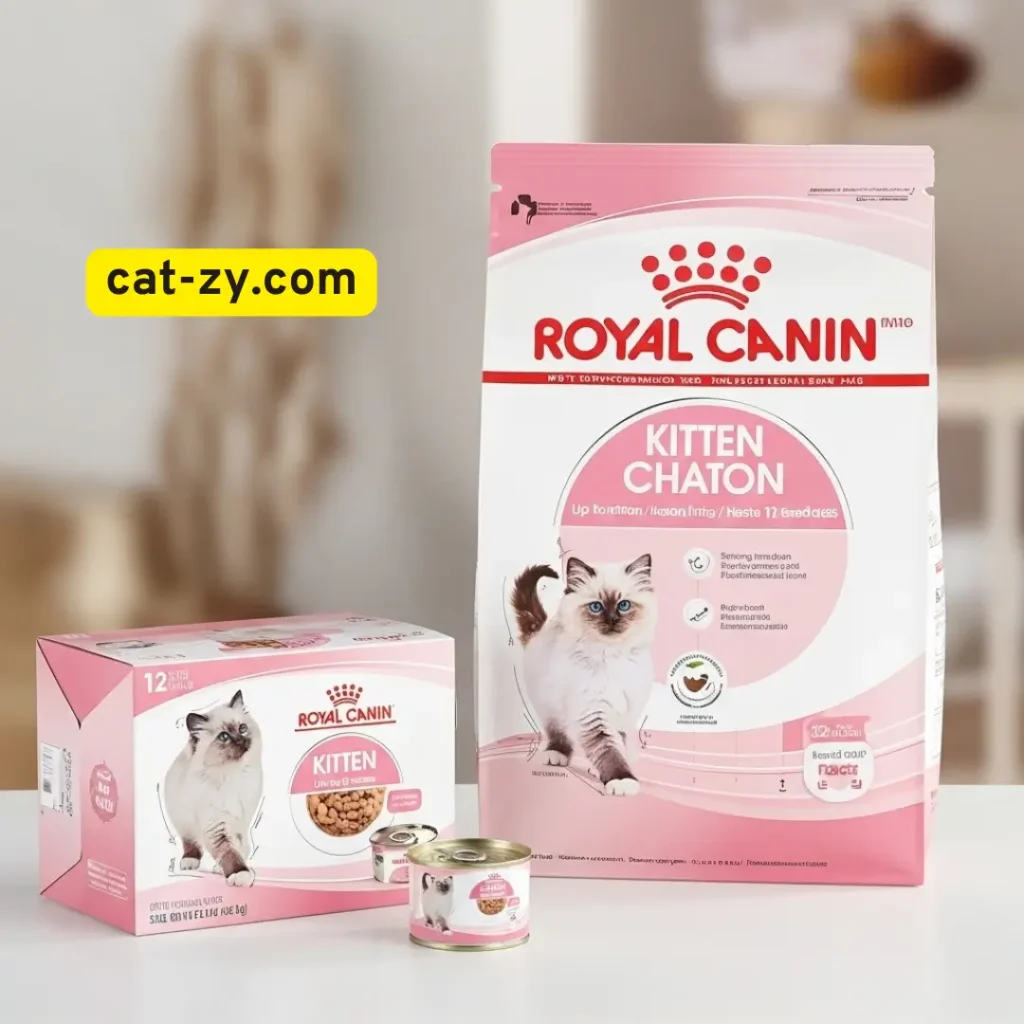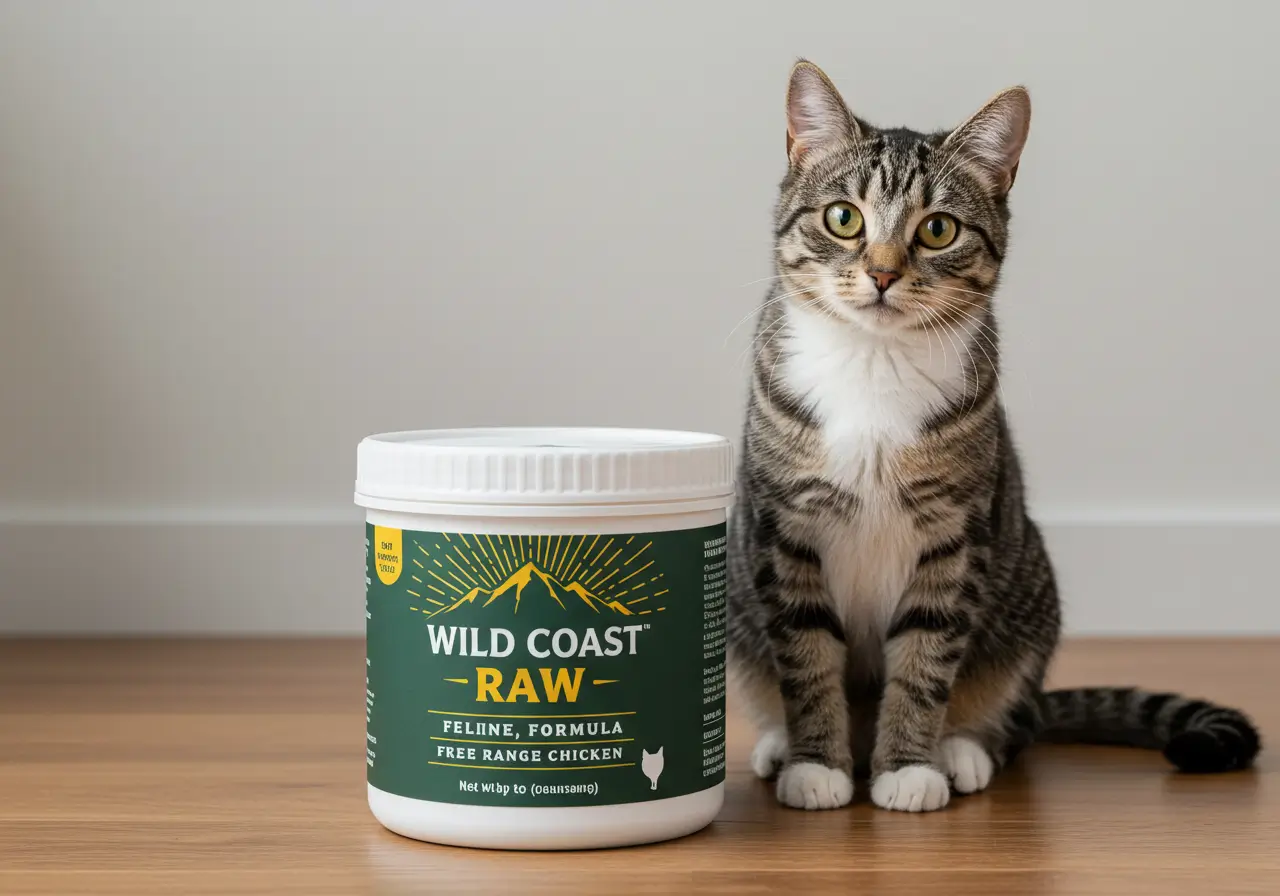Can Cats Eat Blueberries: 5 Shocking Health Secrets
If you own a cat, you’re always looking for healthy treats. You might wonder if blueberries are good for your cat. Many cat owners want to share fruits with their pets, but it’s important to know the risks and benefits.
Choosing the right foods for your cat is key to their health. Some human foods are safe for cats, but others are not. So, should you let your cat have blueberries? We’ll look at the good and bad sides of blueberries for cats, so you can decide what’s best for your pet.
Table of Contents
The Truth About Cats and Human Foods
Knowing what human foods are safe for your cat is key to their health. Cats need a diet that’s different from ours. Not all human foods are good for them.

Cats as Obligate Carnivores
Cats are obligate carnivores. They need a diet rich in animal protein. Their bodies are made to digest meat, not carbs.
Why Pet Owners Consider Fruit for Cats
Some pet owners think about adding fruits like blueberries to their cat’s diet. Fruits can offer antioxidants and fiber. These can be good in small amounts.
The Appeal of Blueberries as a Treat
Blueberries are seen as a healthy treat because of their antioxidants and low calories. But it’s important to introduce them slowly to your cat. This helps avoid any bad reactions.
When adding human foods like blueberries to your cat’s diet, do it in small amounts. Watch how your cat reacts closely.
Can Cats Eat Blueberries? The Definitive Answer
As a cat owner, you might wonder ‘Can cats eat blueberries?’ – if it’s safe to share your blueberries with your feline friend. The answer lies in understanding the perspectives of veterinarians, the importance of moderation, and the specific situations where blueberries might not be the best choice for your cat.
What Veterinarians Say About Blueberries
Veterinarians generally agree that blueberries are not toxic to cats, making them a potentially safe treat in moderation. They also stress that cats have different nutritional needs than humans. Their diet should mainly consist of protein-rich cat food. Blueberries should be considered an occasional treat, not a staple in your cat’s diet.
The Importance of Moderation
Moderation is key when introducing blueberries or any human food into your cat’s diet. Overconsumption can lead to gastrointestinal upset, among other issues. A few blueberries as an occasional treat are unlikely to cause harm, but it’s important to monitor your cat’s reaction.
When to Avoid Giving Blueberries to Cats
There are situations where it’s best to avoid giving blueberries to your cat. For instance, cats with diabetes or those on a strict diet for weight management might need to limit their intake of fruits like blueberries due to their sugar content. Also, cats with known gastrointestinal sensitivities should be introduced to new foods, including blueberries, with caution.

5 Surprising Benefits of Blueberries for Feline Health
When considering whether can cats eat blueberries, it’s worth noting they’re packed with antioxidants and fiber, making them a good treat for cats in small amounts. Cats mainly eat meat, but blueberries can add some extra health benefits.
Powerful Antioxidants for Immune Support
Blueberries are full of antioxidants, which help keep your cat’s immune system strong. Antioxidants fight off free radicals, which can lower the chance of chronic diseases and keep your cat healthy.
Anti-Inflammatory Properties
Blueberries have anti-inflammatory properties that help cats as they get older. Reducing inflammation can ease conditions like arthritis, making your cat’s life better.
Vitamin C and Fiber Content
Blueberries are also a good source of vitamin C and fiber. Cats don’t need a lot of vitamin C, but the fiber helps with healthy digestion and bowel movements.
Low-Calorie Alternative to Commercial Treats

Blueberries are a low-calorie option for treats. They’re great for keeping your cat’s weight in check and avoiding obesity-related health problems.
Potential Cognitive Benefits for Aging Cats
Research shows that blueberries might help older cats’ brains. They could improve memory and thinking skills. Adding blueberries to your cat’s diet might offer long-term benefits.
In summary, blueberries can be a healthy treat for cats if given in small amounts. Always talk to your vet before changing your cat’s diet.
5 Possible Risks of Feeding Blueberries to Your Cat
Blueberries can be a healthy snack, but there are risks. It’s important to think about these risks to keep your cat safe and healthy.
Digestive Upset and Gastrointestinal Issues
Blueberries aren’t toxic to cats, but eating too many can upset their stomach. The fiber in blueberries might cause diarrhea or constipation. Watch your cat’s stool and overall health after giving them blueberries.
Choking and Obstruction Hazards
Cats can choke on blueberries, which are small and round. Swallowing a blueberry whole can also block their intestines. This is a serious problem that needs vet help right away.
Sugar Content and Diabetes Concerns
Blueberries have some sugar, which can be a problem for cats with diabetes. Think about your cat’s diet and health before giving them blueberries.
Allergic Reactions and Sensitivities
Cats can be allergic to foods like blueberries. Allergic reactions can be mild or severe. If your cat acts strangely after eating blueberries, see your vet right away.
Pesticide and Chemical Exposure
Blueberries might have pesticides and chemicals. These can harm cats. To avoid this, pick organic blueberries or wash them well before giving them to your cat.
How to Safely Introduce Blueberries to Your Cat’s Diet
If you’re wondering if cats can eat blueberries and thinking about adding them to your cat’s diet, it’s important to do it right. Blueberries can be good for them, but the wrong introduction can cause problems.

Proper Washing and Preparation Methods
Before giving blueberries to your cat, wash them well. This removes pesticides and dirt. Use water and vinegar to clean them. Take off any stems or leaves to avoid choking hazards.
Choose fresh or frozen blueberries. Avoid canned or jarred ones because of added sugars and preservatives.
Appropriate Serving Sizes by Cat Weight
The right amount of blueberries for your cat depends on their weight. Give 1-2 blueberries for every 10 pounds of body weight each day. So, a 20-pound cat can have 2-4 blueberries.
Start with small amounts to avoid upset stomachs.
Signs Your Cat Enjoys or Dislikes Blueberries
Watch how your cat reacts to blueberries. If they eat them happily, it’s a good sign. But if they ignore them or spit them out, don’t force it.
Some cats prefer certain tastes or textures.
Monitoring for Adverse Reactions
Observe your cat once you’ve introduced blueberries to their diet. Look for signs like vomiting, diarrhea, or being very tired. Should you notice these symptoms, contact your veterinarian immediately.
Always put your cat’s health and safety first when trying new foods.
Can Kittens Eat Blueberries? Age-Specific Considerations
Kittens have special nutritional needs. Adding blueberries to their diet needs careful thought. As they grow, their diet must change, and treats like blueberries play a role in their nutrition.
Nutritional Needs During Kitten Development

Kittens need lots of protein and specific nutrients for fast growth. High-quality kitten food is key, providing important vitamins and minerals. Blueberries are good for adult cats, but kittens have different needs.
Special Precautions for Young Cats
Introducing blueberries to kittens requires caution. Their digestive systems are developing, and new foods can upset their stomachs. Kittens are also at risk of choking, so treats must be safe and easy to eat.
Safer Alternatives for Kittens
For kittens, it’s best to stick with their regular, nutrient-rich food. If you want treats, choose kitten-safe, protein-based treats that match their nutritional needs. Always talk to a vet before changing your kitten’s diet.
In summary, while blueberries aren’t toxic to kittens, introducing them should be done with care. It’s better to choose more balanced treat options for kittens.
Berry Comparison: Strawberries, Raspberries, and Blackberries for Cats
Beyond asking Can cats eat blueberries, you might wonder about sharing other berries with your cat – it’s key to know which ones are safe. Berries like strawberries, raspberries, and blackberries are popular. Let’s look at each one to help you decide.
Strawberries: Benefits and Risks for Cats
Strawberries are okay for cats in small amounts. They have vitamins and antioxidants that are good. But strawberries should be given without stems or leaves to avoid stomach problems. Also, they’re sweet, so they should be a rare treat.
Raspberries: Safe Consumption Guidelines
Raspberries are safe for cats, but only a little bit. They have fiber and antioxidants that are good. But raspberries have a compound that needs caution. Limit the quantity to prevent stomach issues.
Blackberries: Nutritional Value for Felines
Blackberries are full of vitamins, minerals, and antioxidants. They’re a healthy treat for cats. Ensure they are washed thoroughly to remove pesticides. Like other berries, blackberries should be a treat, not a main food.
Which Berry is Safest for Your Cat?
All three berries can be safe for cats, but blackberries are often safer. They have more nutrients and less sugar than strawberries. Raspberries are safe, but be careful not to give too many to avoid stomach problems.
Processed Blueberry Foods: Why Cats Should Never Eat Blueberry Muffins
Fresh blueberries can be a healthy treat for cats in small amounts. But processed blueberry foods like muffins are not safe. The ingredients in baked goods can harm your cat’s health.
Dangerous Ingredients in Baked Goods
Baked goods, such as muffins, have ingredients not good for cats. These include chocolate, raisins, and nuts, which are toxic. Even without these, muffins are not safe for cats.
Xylitol, Sugar, and Fat Concerns
Many baked goods have xylitol, a sugar substitute toxic to cats. Also, muffins’ high sugar and fat content can cause obesity, diabetes, and other health problems in cats.
The Difference Between Fresh and Processed Blueberries
Fresh blueberries are full of antioxidants and fiber, making them a safe treat in small amounts. But processed blueberries in muffins are mixed with harmful ingredients. This makes them dangerous for cats.
In conclusion, it’s best to keep blueberry muffins and other baked goods away from your cat. Choose fresh, cat-safe treats to keep your pet healthy and happy.
Healthy Alternatives to Blueberries for Feline Treats
There are many healthy treats you can give your cat, other than blueberries. These treats can keep your cat’s diet interesting and balanced. It’s good to mix things up to prevent boredom and ensure they get all the nutrients they need.

Cat-Safe Fruits and Vegetables
Some fruits and veggies are safe for cats. Cooked carrots and green beans are great, low-calorie snacks. Strawberries are okay in small amounts, but make sure to remove the leaves and stems. Pumpkin is also good for them, as it’s high in fiber and helps with digestion.
Protein-Based Treat Options
Cats need a lot of protein, so protein-based treats are a good choice. Small pieces of cooked chicken or salmon are tasty and full of protein. They can be a nice change from regular cat treats.
Commercial vs. Natural Treat Comparison

You can choose between store-bought cat treats and natural ones. While store-bought treats are easy to find, natural options like freeze-dried chicken or carrots are healthier. They have fewer preservatives and additives.
Creating a Balanced Treat Routine
To keep your cat’s diet interesting, mix up the treats you give them. Make sure treats don’t make up more than 10% of their daily calories. This prevents them from getting too many calories. Always talk to your vet before changing your cat’s diet.
Conclusion: Balancing Treats in Your Cat’s Diet
As a cat owner, answering the question ‘Can cats eat blueberries’ is important for your pet’s health. Blueberries can be a healthy treat for cats if given in small amounts. They are full of antioxidants, have anti-inflammatory effects, and are rich in fiber and vitamins.
But there are risks like digestive problems, choking, and allergies. To safely give blueberries to your cat, make sure to wash them well and serve the right amount. Watch your cat for any bad reactions.
It’s important to balance treats like blueberries with a complete, nutritious diet. Always talk to your vet before changing your cat’s diet, including adding new foods or treats. This way, you can help your cat stay happy and healthy.
FAQ
Can cats eat strawberries?
Strawberries are not toxic to cats. But they should eat them in small amounts. This is because of their sugar and the chance of stomach upset.
Are blueberries safe for kittens to eat?
Blueberries are not toxic to kittens. But, kittens have special needs. They should only have a little, if any, under a vet’s advice.
Can cats eat raspberries or blackberries?
Raspberries and blackberries are not toxic to cats. But they should eat them in small amounts. Raspberries have a lot of fiber, which can upset their stomach if eaten too much.
Is it safe to give my cat blueberry muffins?
No, it’s not safe to give your cat blueberry muffins. Baked goods can have harmful things like xylitol, chocolate, and too much sugar and fat.
How should I introduce blueberries to my cat’s diet?
Start with small amounts of blueberries to avoid stomach problems. Make sure they are clean. You might want to mash or puree them to prevent choking.
What are the benefits of blueberries for cats?
Blueberries can be good for cats. They have antioxidants, can fight inflammation, and boost the immune system.
Can cats be allergic to blueberries?
Yes, cats can be allergic or sensitive to blueberries. Watch how your cat acts and feels after eating them. If they seem sick, talk to a vet.
Can cats eat blueberry?
Yes, cats can eat a single blueberry as an occasional treat. Like multiple blueberries, one blueberry should be washed thoroughly and given in moderation. Watch your cat closely for any negative reactions following the feeding. Always consult your veterinarian before introducing new foods to ensure they’re appropriate for your cat’s specific health needs and dietary requirements.
Can cats eat blueberry yogurt?
No, cats should not eat blueberry yogurt. Most cats are lactose intolerant and cannot properly digest dairy products like yogurt, which can cause digestive upset, diarrhea, and stomach problems. Additionally, commercial blueberry yogurt contains added sugars, artificial flavors, and preservatives that are harmful to cats. Stick to fresh blueberries instead if you want to offer this fruit.
Can cats eat frozen blueberries?
Yes, cats can eat frozen blueberries, but they should be thawed and brought to room temperature first. Frozen blueberries can be too hard and pose a choking hazard or damage your cat’s teeth. Always wash frozen blueberries thoroughly before serving, even if they’re organic. Serve the same small portions as fresh blueberries – 1-2 berries per 10 pounds of body weight.








